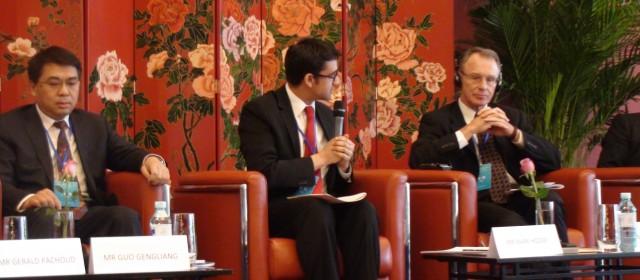China and Human Rights

GE is a member company of the Global Business Initiative on Human Rights, or GBI, which is made up of 18 multinational companies, including Coca-Cola, Total, ABB, Shell, Flextronics, Novo Nordisk and HP. GBI’s purpose is to bring the discussion of businesses’ role in respecting human rights to “emerging market” countries and regions where human rights are under pressure. Recent GBI gatherings have taken place in Brazil, Egypt, Kenya and, most recently, China.
GBI leadership spent over a year planning its meeting in Beijing—held recently. As you can imagine, there was substantial concern about discussing human rights with Chinese businesses and civil society representatives. While there have been conferences in China on corporate social responsibility, this is the first conference we are aware of that focused primarily on human rights. This focus was prompted by the UN Human Rights Council’s having unanimously adopted the Guiding Principles on Business and Human Rights in 2011—encouraging all business entities, including Chinese businesses, to respect human rights in their commercial operations. Leading up to the conference, there was considerable angst among GBI member companies about whether we should use the term “human rights” in our discussions or whether we would be safer speaking of the term’s component rights, such as freedom from discrimination, privacy, religious freedom, the right to collective bargaining and so on.
Fortunately, some key cosponsors of the conference were able to allay some of these concerns. In addition to the UN Global Compact’s local network (the China Enterprise Confederation, essentially the Chinese Chamber of Commerce), the Chinese shipping giant Cosco and Tsinghua University agreed to sponsor the conference. Also attending were representatives from China Development Bank, China Mobile Communications Corporation, Sinosteel and other, smaller Chinese companies. The Cosco representative showed particular leadership and spoke at the opening gathering of nearly 200 attendees. GBI member companies came away with the unanimous view that Chinese companies were more comfortable talking about business and human rights than any of us individually or collectively expected. As GE has over 20 joint-venture partners in China, this was good news.
We engaged in many noteworthy conversations at the conference. Following are we feel could be of interest.
- One of the Chinese corporations that attended the conference was a hydropower company that operates in Myanmar (Burma). While it operates several hydro-electric dams in that country, in September 2011 it was asked to close down operations at one dam due to concerns over practices that fueled fighting between the national army and the Kachin rebels. A company spokesman who was asked about the situation by a Chinese attendee expressed surprise at the forced exit from Burma. He explained that his company had approval from the Burmese central government and, from his experience, this was all the licensee needed to do business— that it was not accustomed to paying attention to local ethnic-diversity issues. GE advisors noted that this withdrawal of the right to operate in Myanmar had not gone unnoticed within Chinese business circles and has prompted greater discussion about how Chinese businesses operating in foreign jurisdictions need to pay more attention to local human rights issues.
- Another Chinese company noted that significant Chinese foreign investment began only in 2005 but that it has ramped up significantly since then. Consequently, Chinese companies have relatively little experience managing these investments and need to attend conferences such as GBI’s in order to learn how to address the human rights challenges that accompany them.
- During the trip I also spoke at Peking University Law School (PKU). PKU is widely viewed as the equivalent in China of Harvard Law School and I was pleasantly surprised to learn that it offers a course on human rights law. I presented GE’s approach to human rights and business, and a colleague from BASF described its approach to human rights due diligence.
You have to be impressed by the candor of these conversations. I hope it gives you a sense that businesses around the globe are increasingly recognizing their obligation to respect human rights. This is a good thing for the citizens of the world and for GE.
Read about China and Human Rights on GE's Thoughts from Stakeholders blog.

